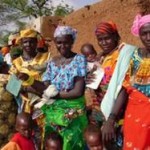 |
Every day, Minta, a 40 year-old mother of six, fetches water for the household, does the laundry in the river, labours on her millet farm and, if there is food, prepares the family meals before collapsing into bed, exhausted.But during this particularly difficult lean season, there is no food, and the daily grind has become even more unbearable. With her youngest child wasting away from hunger, Minta has had to walk three hours in the scorching sun on an empty stomach in the hope of getting some food aid.“My husband has a donkey, but I don’t know how to ride it,” she said apologetically |
Every day, Minta, a 40 year-old mother of six, fetches water for the household, does the laundry in the river, labours on her millet farm and, if there is food, prepares the family meals before collapsing into bed, exhausted.But during this particularly difficult lean season, there is no food, and the daily grind has become even more unbearable. With her youngest child wasting away from hunger, Minta has had to walk three hours in the scorching sun on an empty stomach in the hope of getting some food aid.
“My husband has a donkey, but I don’t know how to ride it,” she said apologetically.
She sits under the trees, sharing the shade with hundreds of other women hoping to receive food and medical aid at the main hospital in Tillabery, some 100 km northwest of the capital Niamey in one of the areas worst affected by Niger’s ongoing food crisis. Minta has never been to school. She can’t read or write. She has never even used a telephone. Once – and only once – she travelled in a car.
For Minta, and the other women at the hospital, the hunger that has reduced her children to skin and bone is just another hard fact of life. At the hospital the women each cradle at least one baby and most have a toddler or two in tow. Some babies — like the one curled in the folds of Minta’s blue tunic — are little more than tiny skeletons. When news broke that a convoy of trucks with food aid was approaching Tillabery, Minta’s face lit up. Perhaps her baby, among the skinniest of all babies in the yard, was going to make it after all. The food crisis that has affected 3.6 million people in Niger, has highlighted the vulnerable position of women in what is a staunchly Muslim and conservative society and the second poorest country in the world, according to UN figures.
-Women bear the brunt

“When you say food crisis, you say women,” Aissata Bagna, a prominent female activist and former health minister, told IRIN in her home in Niamey.
“Men can go elsewhere, they can work for food or move away from the village. But the women have to stay behind. They have to take care of the children. They suffer the most,” she said. The wave of democratisation that swept through West Africa in the early nineties spawned the first women’s groups in Niger and increased their political influence. But at the same time, social progress was hampered by the rapid rise of religious fundamentalism, Bagna explained.
“The influence of the fundamentalists is very strong, but they’re not the only reason why women are being oppressed,” said Bagn “In Niger, we use three law systems: Muslim law, traditional law and French-inspired common law. It’s very ambiguous. As a result, a man can reject his wife after 15 years of marriage and leave her with nothing.” According to Bagna, women in Niger are sidelined to a much greater degree than in neighbouring Muslim countries like Burkina Faso and Mali. But Islamic fundamentalism and patriarchal tradition are not the only factors shaping women’s lives in Niger. Deeply-rooted and grinding poverty also has a significant part to play in the rubric, say aid workers. More than half of the population of Niger lives on less than a dollar a day, and access to health care, education, and safe drinking water is difficult or impossible for all but the country’s small elite.
Women’s education key to development
However, even in an impoverished society educating women could make a significant contribution to preventing food crises in the future, aid workers say.
“Women who have gone to school provide better care, they know how to feed a child and they understand why children should get vaccinations,” said Eric Slade, working as an education advisor for aid agency Concern in Niger. “The good side of this crisis is that it has put Niger on the map,” he said. “Maybe we can focus on long-term development now.” It is no coincidence, point out health workers, that Niger has a very low adult female literacy rate of only nine percent and a very high infant mortality rate. Even in a year of good harvests, one in four children die before the age of five, according to the UN Population Fund. Educated women are more likely to delay or space their pregnancies, so reducing the risk of low birth-weight babies, infant death and infant malnutrition, according to the Mother’s Index — an annual overview of women’s health compiled by UK-based NGO Save the Children.
Instead, Niger has the highest fertility rate in the world with each woman having on average eight or nine children.
Dealing with authoritarian husbands
While lack of education is one obstacle to healthier children and proper family planning, authoritarian husbands are another. Rural women often have no say in the matter of birth control, health workers say. In the small town of Diambala, several kilometres north of Tillabery, the local doctor told IRIN that most men are against the use of contraceptives even if their wives would prefer to postpone their pregnancies. “The men are the main problem,” said doctor Ousmane Boubacar. “There is a saying: ‘Every mouth will be fed by God’. This is what they believe.” Of the 5,000 or so women under Boubacar’s care, only two or three use modern contraceptives. Frightened of trouble, Boubacar will only administer the monthly hormone injections with the express permission of the women’s husbands.
“Unfortunately, I have to tell women that they need permission from their husbands,” he said. “Otherwise I’ll be having angry farmers knocking at my door.”
Around his clinic, hundreds of women cradling small children had been waiting for hours for a food distribution as it had been rumoured earlier that week that aid was imminent. Sitting in a room adjacent to the doctor’s, a busty elderly woman pointed out her daughters, grandchildren and great-grandchild, waiting for the food trucks to arrive. “Our husbands are not working,” said 50-year-old Ladi Souley. “The whole family has come to me for help, but it is a big family and my food supplies are not sufficient.”
Asked if her daughters had ever discussed contraceptives with their respective husbands to limit the size of the family, Souley gave a weary smile.
“It’s impossible,” she said. “Husbands refuse it. A woman risks divorce when she insists on birth control. But men don’t understand that life is becoming more and more expensive.”
ஊடறுவுக்காக பத்மி



